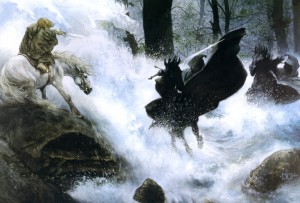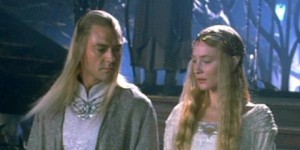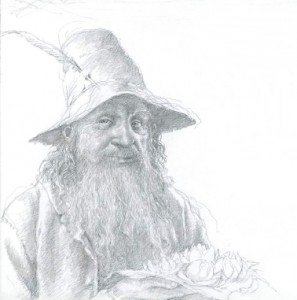4) Glorfindel

“Suddenly into view below came a white horse, gleaming in the shadows, running swiftly. In the dusk its headstall flickered and flashed, as if it were studded with gems like living stars. The rider’s cloak streamed behind him, and his hood was thrown back; his golden hair flowed shimmering in the wind of his speed. To Frodo it appeared that a white light was shining through the form and raiment of the rider, as if through a thin veil.”
Flight to the Ford, The Lord of the Rings.
He’s just that elf dude who lends Frodo a horse, right? Well, Asfaloth is pretty important to spiriting Frodo out of reach of the onrushing Nazgúl, but Glorfindel’s importance actually extends much further. In fact, without Glorfindel to drive the three Black Riders from the Last Bridge the quest may have had an early, tragic end and not have even reached Rivendell.
Could Aragorn have driven the Riders from the bridge alone? Not impossible, but he had four Hobbits to shepherd, and one of them was deathly ill. And if they’d had to find a long way round, there’s no way that Frodo would have survived the long, arduous journey.
When they meet, Glorfindel tells Aragorn that there were few even in Rivendell able to face the Nazgúl, and that it was his lot to take the East Road. Consider: this is obviously where the greatest danger lies, and potentially the greatest need to provide help. I’ll leave you to draw the obvious conclusions about what that says about Glorfindel.
Finally, although he has helpers, Glorfindel also plays the key role in forcing the Nazgúl into the Bruinen. Without that, the Riders might have well “beseiged” Rivendell and denied the Ring the chance to go any further.
5) Celeborn the Wise

“Very tall they were, and the Lady no less tall than the Lord; and they were grave and beautiful. They were clad wholly in white; and the hair of the Lady was of deep gold, and the hair of the Lord Celeborn was of silver long and bright; but no sign of age was upon them, unless it were in the depths of their eyes; for these were keen as lances in the starlight, and yet profound, the wells of deep memory.”
The Mirror of Galadriel, The Lord of the Rings.
Let’s face it, in Lothlórien, Galadriel is pre-eminent. I’ve previously written at length about her political nous, and she plays a key role in both assisting the Quest and stymieing Sauron. Still, Celeborn is no cipher. She accounts him as the wisest of the elves of Middle-earth.
Some of that might be spousal pride. But Celeborn sees clearly to the heart of the Fellowship’s dilemma. His offer of boats is practical, useful and, in typically elven fashion, doesn’t deny the group their own agency. In fact, not only does he leave the ultimate choice in their hands, his deft suggestion gives the party more time to come to a better decision. He has the wisdom to enable, without the urge to meddle.
His exchange with Gimli also reveals his smarts on two counts: the Balrog is a fearsome demon of the Elder Days, and learning of one so nearby, Celeborn is right to be wary of its potential for havoc and destruction. More, his statement that he might have denied the Fellowship refuge proves that he governs as co-equal with Galadriel.
Yet, he also shows a trait that other elves in positions of power, especially in The Silmarillion, sorely lack: the ability to listen to sage advice and admit error. Thingol dooms Doriath in this way by ignoring Melian; Turgon fails to heed Tuor’s message with fatal results. Galadriel reproaches Celeborn, reminding him of the urgent need of the Quest, and he admits the truth of her argument. This, perhaps, is why he is Celeborn the Wise and why “when at last he sought the Grey Havens… with him went the last living memory of the Elder Days in Middle-earth”.
6) Tom Bombadil

“… there appeared above the reeds an old battered hat with a tall crown and a long blue feather stuck in the band. With another hop and a bound there came into view a man, or so it seemed. At any rate he was too large and heavy for a hobbit, if not quite tall enough for one of the Big People, though he made noise enough for one, slumping along with great yellow boots on his thick legs, and charging through grass and rushes like a cow going down to drink. He had a blue coat and a long brown beard; his eyes were blue and bright, and his face was red as a ripe apple, but creased into a hundred wrinkles of laughter.”
The Old Forest, The Lord of the Rings.
It’s hard to argue that Bombadil is an overlooked character, but I’m pretty certain he is a most misunderstood fellow. After all, it’s easy to regard him merely as a figure of whimsy, his quaint folksiness and alliterative poetry at odds with the epic scope of The Lord of the Rings. Yet Bombadil is a bit like an iceberg: he has hidden depths.
At the core this is driven by his unique immunity to the Ring. In this he symbolises a very particular attitude to power and control, and that there are neutrals in any struggle. Rather than wibble on endlessly about it myself, I’ll let the author make the point far more clearly and concisely than I could ever manage:
“The story is cast in terms of a good side, and a bad side, beauty against ruthless ugliness, tyranny against kingship, moderated freedom against compulsion that has long lost any object save mere power, and so on; but both sides in some degree, conservative or destructive, want a measure of control. But if you have, as it were taken ‘a vow of poverty’, renounced control, and take delight in things for themselves without reference to yourself, watching, observing, and to some extent knowing, then the question of the rights and wrongs of power and control might become utterly meaningless to you, and the means of power quite valueless.”
Letter #144, The Letters of J.R.R. Tolkien.
Of course, you may have other suggestions and ideas! Others such as Goldberry, Gildor, Bergil and even The Gaffer all have their roles to play in the story. Add yours, and your reasons why, in the comments! I’m not sure anyone could make a case for the Talking Fox, though.
Demosthenes has been an incredibly nerdy staff member at TheOneRing.net since 2001. The views in this article are his own, and do not necessarily represent those of other TORn staff.


